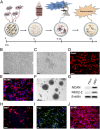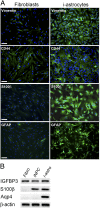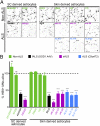Direct conversion of patient fibroblasts demonstrates non-cell autonomous toxicity of astrocytes to motor neurons in familial and sporadic ALS
- PMID: 24379375
- PMCID: PMC3896192
- DOI: 10.1073/pnas.1314085111
Direct conversion of patient fibroblasts demonstrates non-cell autonomous toxicity of astrocytes to motor neurons in familial and sporadic ALS
Abstract
Amyotrophic lateral sclerosis (ALS) causes motor neuron degeneration, paralysis, and death. Accurate disease modeling, identifying disease mechanisms, and developing therapeutics is urgently needed. We previously reported motor neuron toxicity through postmortem ALS spinal cord-derived astrocytes. However, these cells can only be harvested after death, and their expansion is limited. We now report a rapid, highly reproducible method to convert adult human fibroblasts from living ALS patients to induced neuronal progenitor cells and subsequent differentiation into astrocytes (i-astrocytes). Non-cell autonomous toxicity to motor neurons is found following coculture of i-astrocytes from familial ALS patients with mutation in superoxide dismutase or hexanucleotide expansion in C9orf72 (ORF 72 on chromosome 9) the two most frequent causes of ALS. Remarkably, i-astrocytes from sporadic ALS patients are as toxic as those with causative mutations, suggesting a common mechanism. Easy production and expansion of i-astrocytes now enables rapid disease modeling and high-throughput drug screening to alleviate astrocyte-derived toxicity.
Keywords: neurodegeneration; neurotoxicity; reprogramming.
Conflict of interest statement
The authors declare no conflict of interest.
Figures



References
-
- Ferraiuolo L, Kirby J, Grierson AJ, Sendtner M, Shaw PJ. Molecular pathways of motor neuron injury in amyotrophic lateral sclerosis. Nat Rev Neurol. 2011;7(11):616–630. - PubMed
-
- Di Giorgio FP, Boulting GL, Bobrowicz S, Eggan KC. Human embryonic stem cell-derived motor neurons are sensitive to the toxic effect of glial cells carrying an ALS-causing mutation. Cell Stem Cell. 2008;3(6):637–648. - PubMed
Publication types
MeSH terms
Substances
Grants and funding
LinkOut - more resources
Full Text Sources
Other Literature Sources
Medical
Research Materials
Miscellaneous

